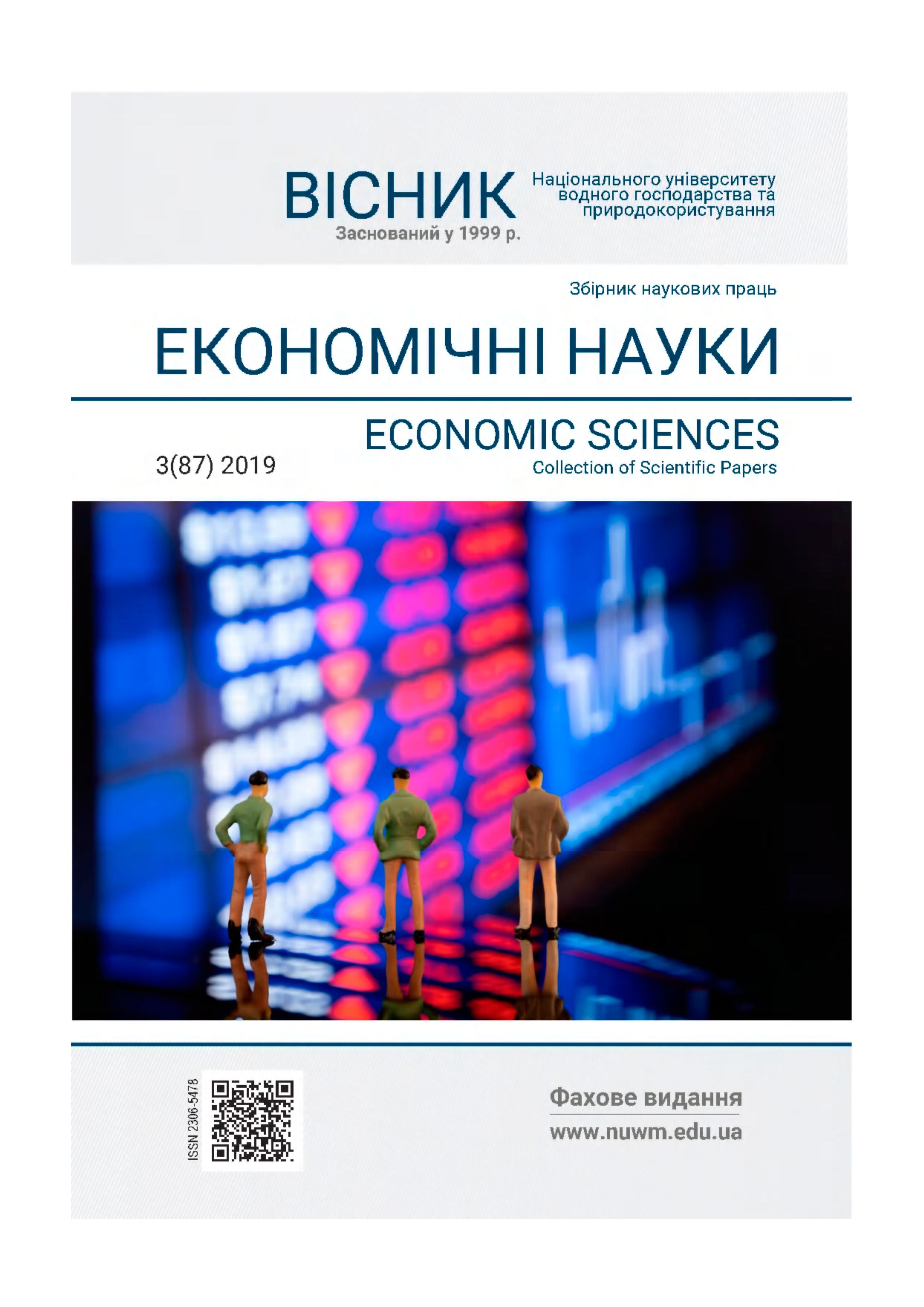ECONOMIC ANTHROPOLOGY IN THE SYSTEM OF METHODOLOGICAL RESEARCH OF SOCIAL PROCESSES
DOI:
https://doi.org/10.31713/ve320199Keywords:
methodologies, scientific schools, social processes, economics, economic anthropology, corporate.Abstract
It is determined that in the process of determining the methodology ofscientific research of social processes in society, an importantscientific task is the choice or combination of methodologies ofdifferent scientific schools. An important task is also to take into account the shift in priorities in value creation and national incomegeneration – from the production of goods to the provision of services.It is established that it makes sense to distinguish the followingapproaches in the study of social phenomena: interdisciplinaryapproach, systematic consideration of features, problems andprospects of development of social phenomena, information supportof the study, practical opportunity to obtain research results,historical approach, objectivity.The author's methodological concept of the research is proposed,which is based on a group of methods. According to the degree ofcommunity in our study, the following groups of methods aredistinguished: philosophical, general scientific, private, specialmethods, sociological.The most interesting from a theoretical point of view is the relativelynew scientific concept, the concept of economic anthropology. One ofthe theoretical tenets of this concept is the division of social values,interests of the individual, the worker into public and public. It isdetermined that economic activities and exchange processes based onthe agent's practical experience, cultural environment, clan (class)affiliation were characteristic of societies with underdeveloped formsof exchange (totalitarian, centralized, subsistence farming). Atpresent, the highest manifestation of this form of economic activity isthe types of economy that are classified by cultural grounds. Thereare peculiarities of the market-liberal model of economy, Islamicmodel, Confucian and Buddhist. In a global economy, national culturalfeatures in the field of business organization and exchange areexpanding to subregional cultures and subregional economic models.References
Інститут соціології НАН України. URL: http://i-soc.com.ua ; (дата звернення: 27.09.2019).
Lenski G. Societal Taxonomies: Mapping the Social Universe. Аnnual Review of Sociology. 1994. Vol. 20. P. 1–26.
Ю. Осокіна. Шпенглер Освальд. Політична енциклопедія / редкол.: Ю. Левенець (голова), Ю. Шаповал (заст. голови) та ін. К. : Парламентське видавництво, 2011. С. 787.
Галушко К. Ю. Тойнбі Арнольд-Джозеф. Енциклопедія історії України : у 10 т. / редкол.: В. А. Смолій (голова) та ін., Інститут історії України НАН України. К. : Наук. думка, 2013.
Блауг М., Парето Вільфредо. 100 великих економістів до Кейнса. СПб. : Економікус, 2008. С. 233–235.
Mason W. L. Patterns of Authority: A Structural Basis for Political Inquiry by Harry Eckstein and Ted Robert Gurr. The Journal of Politics. 1977. № 1. P. 228–229.
Спиця Н. В. Проблеми методології дослідження процесів самоорганізації суспільства. Гуманітарний вісник Запорізької державної інженерної академії. 2010. Вип. 41. С. 178–193.
Джинджоян В. В. Дослідження соціальних процесів в умовах складного методологічного плюралізму. Інвестиції: практика та досвід. 2019. № 19. С. 18–22.
Ісакова О. І. Теорія та методологія прогностичних досліджень соціальних процесів. Збірник наукових праць Таврійського державного агротехнологічного університету. Економічні науки. 2015. № 1. С. 161–165.
Ашкеров А. Ю. Экономическая и антропологическая интерпретации социального обмела. Социологический журнал. 2001. № 3. С. 71–87.
Белик А. А. Экономическая антропология: взаимодействие экономики и культуры. Экономический журнал. Издательство «Ипполитова», 2010. Issue 20. P. 64–86.
Резник М. Ю. Социальная антропология как научная дисципліна. Социологические исследования. 1997. № 5. С. 100–111.
Наукові основи та імплементація світових практик місцевого самоврядування та об’єднання територіальних громад : колективна монографія / Сазонець І. Л., Алейнікова О. І. та ін. ; за наук. ред. д.е.н., проф. Сазонця І. Л. Рівне : Волин. обереги, 2017. 200 с.
Шрадер Х., Тавровский А. Экономическая антропология. Программа курса. Журнал социологии и социальной антропологии. 2000. № 1. С. 3.
REFERENCES:
Instytut sotsiolohii NAN Ukrainy. URL: http://i-soc.com.ua ; (data zvernen nia: 27.09.2019).
Lenski G. Societal Taxonomies: Mapping the Social Universe. Annual Review of Sociology. 1994. Vol. 20. P. 1–26.
Yu. Osokina. Shpenhler Osvald. Politychna entsyklopediia / redkol.: Yu. Levenets (holova), Yu. Shapoval (zast. holovy) ta in. K. : Parlamentske vydavnytstvo, 2011. S. 787.
Halushko K. Yu. Toinbi Arnold-Dzhozef. Entsyklopediia istorii Ukrainy : u 10 t. / redkol.: V. A. Smolii (holova) ta in., Instytut istorii Ukrainy NAN Ukrainy. K. : Nauk. dumka, 2013.
Blauh M., Pareto Vilfredo. 100 velykykh ekonomistiv do Keinsa. SPb. : Ekonomikus, 2008. S. 233–235.
Mason W. L. Patterns of Authority: A Structural Basis for Political Inquiry by Harry Eckstein and Ted Robert Gurr. The Journal of Politics. 1977. № 1. P. 228– 229.
Spytsia N. V. Problemy metodolohii doslidzhennia protsesiv samoorhanizatsii suspilstva. Humanitarnyi visnyk Zaporizkoi derzhavnoi inzhenernoi akademii. 2010. Vyp. 41. S. 178–193.
Dzhyndzhoian V. V. Doslidzhennia sotsialnykh protsesiv v umovakh skladnoho metodolohichnoho pliuralizmu. Investytsii: praktyka ta dosvid. 2019. № 19. S. 18–22.
Isakova O. I. Teoriia ta metodolohiia prohnostychnykh doslidzhen sotsialnykh protsesiv. Zbirnyk naukovykh prats Tavriiskoho derzhavnoho ahrotekhnolohichnoho universytetu. Ekonomichni nauky. 2015. № 1. S. 161–165.
Ashkerov A. Yu. Еkonomіcheskaia і antropolohіcheskaia іnterpretatsіі sotsіalnoho obmela. Sotsіolohіcheskіi zhurnal. 2001. № 3. S. 71–87.
Belіk A. A. Еkonomіcheskaia antropolohіia: vzaіmodeistvіe еkonomіkі і kulturу. Еkonomіcheskіi zhurnal. Іzdatelstvo «Іppolіtova», 2010. Issue 20. P. 64–86.
Reznіk M. Yu. Sotsіalnaia antropolohіia kak nauchnaia dіstsіplina. Sotsіolohіcheskіe іssledovanіia. 1997. № 5. S. 100–111.
Naukovi osnovy ta implementatsiia svitovykh praktyk mistsevoho samovriaduvannia ta obiednannia terytorialnykh hromad : kolektyvna monohrafiia / Sazonets I. L., Aleinikova O. I. ta in. ; za nauk. red. d.e.n., prof. Sazontsia I. L. Rivne : Volyn. oberehy, 2017. 200 s.
Shrader Kh., Tavrovskіi A. Еkonomіcheskaia antropolohіia. Prohramma kursa. Zhurnal sotsіolohі і sotsіalnoi antropolohіі. 2000. № 1. S. 3.

